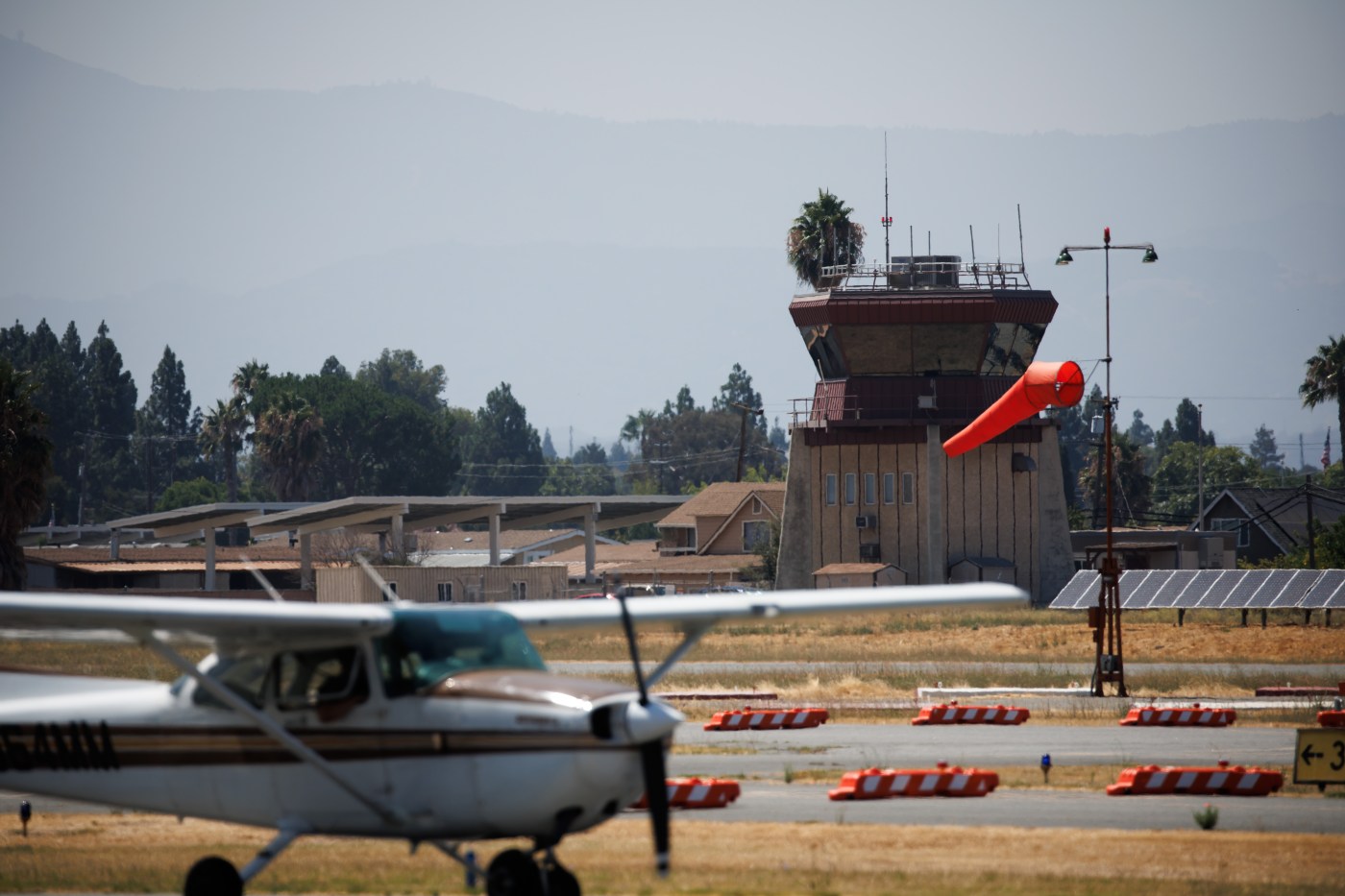By day, San Jose resident Peter Learmonth is a computer systems engineer, but he moonlights as a volunteer command pilot for Angel Flight West, a network of around 3,000 volunteers who provide free medical transportation to people in need to 12 Western U.S. states.
Since 2020, Learmonth has been flying for Angel Flight West, frequently starting his missions by renting a plane at Reid-Hillview Airport — built in 1939, bought by the county in 1961 — and flying to another airport to pick up his passengers. In 2018, the county stopped accepting grants from the Federal Aviation Administration, making 2031 the earliest possible year for the airport’s potential closure once their 10-year grant obligations end.
Although the county hasn’t formally petitioned for the airport to close, supervisors decided to explore different options if Reid-Hillview were to stop service, including moving operations to San Martin Airport or San Jose Mineta International Airport.
Although the question of whether or not the airport may close remains unanswered, Learmonth said the effect of a potential closure was simple: “I may not be able to do Angel Flights, at least in the short term.”
Several pilots based out of Reid-Hillview agreed, saying the airport’s closure would be a loss for emergency services and could make general aviation in Silicon Valley’s biggest city less safe.
The airport was integral to the state’s response to the magnitude 6.9 Loma Prieta earthquake in 1989, when pilots from Reid-Hillview Airport flew 125 tons of earthquake relief supplies to Watsonville Municipal Airport over 300 flights after roads and bridges into Santa Cruz were damaged, according to a U.S. Geological Survey paper about lifelines in the quake’s aftermath.
Reid-Hillview is still a preferred base for many pilots in the South Bay. Santa Clara resident Louise Mateos flew with the Civil Air Patrol in 2020. That nonprofit volunteer organization supports the U.S. Air Force by doing search and rescue missions, disaster response and aiding in counterdrug operations.
Louise Mateos, a pilot who flew with Angel Flight West and Reid-Hillview Disaster Airlift Response Team (RHV-DART), at Reid-Hillview Airport on Aug. 5, 2024, in San Jose, Calif. (Dai Sugano/Bay Area News Group)
With a camera mounted on her plane, Mateos flew from Reid-Hillview in a precise pattern while the pod took photos to record damage from the SCU Lightning Complex and CZU Lightning Complex fires for the Federal Emergency Management Agency.
“I feel happy that I can give back and I can support these, (what) I think are important efforts with the skills that I have,” Mateos said.
County Airports Director Eric Peterson said that airports are not seen as standalone objects, but as part of the National Airspace System, so the FAA would have to evaluate if Reid-Hillview’s closure would be a net benefit to the overall system.
Several emergency response teams use the airport as a base of operations, like the California Disaster Airlift Response Team, abbreviated as CalDART, a nonprofit organization that organizes aviation responses for transportation in disasters.
CalDART comes together at Reid-Hillview Airport once or twice a year for disaster preparation exercises. The CalDART pilots that use Reid-Hillview as a home base make up 10% of CalDART’s total membership, but the airport’s location allows helicopter pilots to reach 80% of Santa Clara County residents within 10 minutes during an emergency, said Paul Marshall, president of CalDART.
“Reid-Hillview gives us one of 22 nodes where we can fly people, and that could be emergency responders, it could be medical technicians, it could be firemen and police that need to help response, cadaver teams, they could be bringing food in, that’s an important asset that we wouldn’t want to lose,” Marshall said.
Pilot Stephen McHenry of San Martin with his Twin Comanche airplane at Reid-Hillview Airport on Aug. 7, 2024, in San Jose, Calif. (Dai Sugano/Bay Area News Group)
Stephen McHenry, president of the San Martin Neighborhood Association, advocated against moving Reid-Hillview Airport’s operations to San Martin Airport. He said there isn’t enough space to park all the planes kept at Reid-Hillview at San Martin Airport, and other alternative airports, like those in Palo Alto, Hayward, Watsonville or Hollister, are either too full or too far for pilots to drive to their planes.
If Reid-Hillview Airport’s operations are transferred to San Martin, that would make the South County airport the 40th busiest airport in the country, McHenry said, a major load for an airport with no air traffic control tower and just one runway. In contrast, Reid-Hillview Airport has two runways and an air traffic control tower regulated by the FAA.
According to FAA data, in the first six months of 2024, San Jose International Airport had around 80,000 operations, referring to individual takeoffs or landings. In the same amount of time, Reid-Hillview Airport had almost 86,000 operations. However, the two airports complement each other in the types of services they offer. With Reid-Hillview servicing mostly local and general aviation activity, San Jose International Airport reserves its services for commercial airlines.
Diverting Reid-Hillview’s plane traffic to San Jose’s main airport would drastically increase the number of operations but could harm efficiency, with greater spaces needed between takeoffs and landings as the airspace would be shared between large jets and smaller propeller planes.
Santa Clara County Supervisor Cindy Chavez looked optimistically to the airport’s potential 2031 closure, saying such a move would reduce noise in the area, improve air quality and give East San Jose residents more access to public spaces. Chavez suggested turning the land into more park space and stationing a fire department to address fire threats in the nearby foothills.
Eastridge and Reid-Hillview Airport make up almost 300 acres of land, and “between those two significant pieces of property where you have light rails being built,” said Chavez, “you have an opportunity to really reimagine opportunities for the eastside of San Jose.”
Related Articles
California lawmakers dismiss bill to give convicted murderers serving life without parole a chance at release
Chlorine leak prompts hazmat response at East Bay chemical plant
Competing ballot measures aim to improve Berkeley streets, walkways
What threat does lead poisoning pose to Oakland Unified students?
1 in 6 CHP jobs are vacant — despite historic raises and Gov. Newsom’s hiring campaign
However, some pilots disagreed with concerns about lead and land use. Doug Rice, Region 3 vice president of general aviation advocacy group CalPilots, noted to the county airport commission at an August meeting that 3-month average lead concentrations at Reid-Hillview Airport have been below national standards for the last 10 years. Since the airport started requiring unleaded fuel in 2022, lead concentrations were around one-third of the national standard.
While Chavez criticized the airport as a large piece of land that is inaccessible to most residents of San Jose’s most challenged neighborhoods, Marshall said the potential of the airport extends beyond its reputation of controversial lead studies and noise and safety complaints.
Aside from being a training ground and a career launchpad, he said the airport provides opportunities where he and many of the people who are involved in disaster service, including retirees, could give back and do something useful with their time.
Marshall said, “Those of us who do have more time, we look to the long-term, we see the value, we know that most people don’t understand aviation, and so we work hard to try to tell stories so the greater community can understand better what goes on.”












